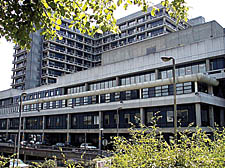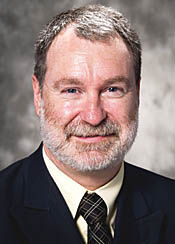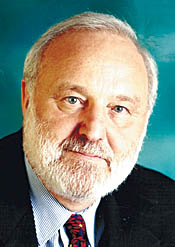|
|
 |
| |

The Royal Free

Royal Free chief executive Andrew Way

MP Frank Dobson
|
'The right people for the job can save NHS'
Some staff at the Royal Free Hospital
say they would rather quit the NHS altogether than reapply for
their own jobs following swingeing cuts, write Richard Osley
and Roisin Gadelrab
HOSPITAL bosses at the Royal Free in Hampstead are desperately
trying to convince staff that there is no need to worry despite
announcing that nearly 500 posts are to be axed.
While chief executive Andrew Way has insisted that there will
be no compulsory redundancies, doctors and nurses at the hospital
in Pond Street have told how they face the unenviable task of
re-applying for their jobs as wards and departments are squeezed
together to cut costs.
One nurse told the New Journal she would rather quit the National
Health Service altogether than fight to be kept on at the Royal
Free. The nurse said she had already been asked to re-apply
for her job at the hospital last year and was not prepared to
go through the tortuous process again.
Other nurses said they feared for the long-term future of their
posts and the financial stability of the entire hospital with
some even suggesting that it could ultimately go bankrupt without
help from the government.
The panic, which showed no signs of dying down over the weekend,
coincided with repeated warnings that cutting staff numbers
would adversely affect patient care.
The Royal Free is among hospitals which claim they are trying
to make patients’ experience easier by minimising the amount
of time they spend in a hospital bed.
Health service professionals and patients remain sceptical that
the explanation is not just an excuse to go ahead with the cuts.
In a blistering speech to more than 500 worried doctors, nurses,
patients and health campaigners, former health secretary Frank
Dobson said on Saturday that government investment had been
wasted on a “paper-chase” system of hiring too many
bureaucrats and not enough concentration on the treatment received
by patients.
The Holborn and St Pancras MP was speaking at an event at the
Friends Meeting House in Euston Road, Euston. organised by campaign
groups the NHS Support Federation and Keep Our NHS Public, which
argues against the use of market forces in the NHS and counts
agony aunt Claire Rayner, Poet Laureate Andrew Motion and author
Phillip Pullman as supporters.
Mr Dobson said: “The paper chase is now swallowing up 15
to 16 percent of NHS spending on administration and paperwork,
compared to the four per cent under the old, non-market system.
“That means spending of upwards of £12 billion on
paperwork. I can’t believe anyone think that’s good
value for money. And this is not just a one off – it will
happen every year.”
He said that government plans to farm out cheap operations to
private providers whilst leaving complicated and expensive work
to the public sector amounted to a “dismantling” of
the NHS.
Asked for his opinion on the Royal Free crisis, Mr Dobson said
he was not surprised by news of job cuts because he had already
been aware of the hospital’s multi-million pound deficit.
He said: “It was obviously on its way. We could have predicted
it.”
Campaigners said they did not support the government’s
‘payment-by-results’ plans for hospitals nor proposals
to give patient’s choice over where they want to be treated.
There were calls for a national demonstration and a lobby of
the government. No local councillors attended.
Another speaker, Lib Dem MP Evan Harris said: “When a patient
goes to see a doctor, they don’t want to be asked what
hospital they want to be treated at. They want to be sent to
where they will get the best treatment. They want there to be
a NHS hospital that can provide the best possible treatment
for them.”
Following news of job cuts at the Royal Free last week, staff
have been sent an information sheet in which bosses admit that
the suggested cutbacks are “daunting”.
The circular reveals where the first changes will be made. Four
wards including the award-winning Berry stroke recovery unit
and the George and Mary ward will be closed.
A staff source on the Berry ward said that nurses were being
moved to the King Edward neurological award.
She said: “The last thing people want to hear after they
have had a stroke is that they are going to have to move. Staff
are worried because they may have to move to jobs within the
hospital and to departments where posts are already taken.”
Chief Executive Andrew Way is convinced that the hospital can
save £25 million over the next twelve months and dent
an overall deficit which is currently hovering at around £30
million. In the long-term, senior managers are gearing towards
the hospital’s bid to gain foundation status – a shake-up
that would ultimately change the way it is managed and financed.
Mr Way told a board meeting on Thursday: “We’re able
to confirm that there will be no redundancies and all staff
will be offered redeployment. We define a vacancy as something
that isn’t filled by permanent staff. We will lose all
of these vacancies. We will not recruit any post until we’re
sure that there’s no-one who can be redeployed into it.”
Mr Way added: “The issue of how many patients we see is
essential – if we treat fewer patients then we lose income.
What it does mean is we would do things differently.
“Where we have admitted patients in the past, they will
now be treated as day patients.”
Mr Way is facing questions as to why, given the scale of cost-cutting
measures, the hospital is advertising posts for four risk managers,
each on a £41,000 a year salary.
In an article written for today’s New Journal, he said
that the Royal Free had to get the right balance of jobs.
He said: “If we employ the right people to do the right
jobs, we can save money.”
But Mr Way will not convince health campaigners who have lined
up to criticise both hospital and government policy. In a letter
to the New Journal, Dr Edward Haworth, who lives in Belsize
Park and trained at the Royal Free Hospital, said that Mr Way’s
own post could be amongst the job cuts. He said: “The increased
spending of the current government seemed like a welcome relief.
Unfortunately, this opportunity has been squandered by incompetent
management, increased bureaucracy and overzealous targets.”
Professor Harry Keen, president of the NHS Support Federation,
said: “We find government trying to apply commercial management
philosophies to health care. A payment by results systems that
could make it more profitable to amputate a leg than to save
it with costly, labour-intensive patient education cannot be
right in our wealthy nation.”
He added: “More money for the NHS must be good. But not
if it is going to pay for a new army of accountants and marketing
managers. We need a modern, flexible and efficient NHS but one
that is also humane, compassionate and responsive.” |
|
 |
|



